
When it comes to SEO, one of the most important steps you can take is to analyze your competitors. By understanding what your competitors are doing, you can identify areas where you can improve your own SEO strategy.
However, conducting a thorough SEO competitor analysis can be time-consuming and challenging. That’s where SEO competitive analysis tools come in. In this article, we will explore some of the best SEO competitive analysis tools available to help you gain a competitive edge.
1. Semrush
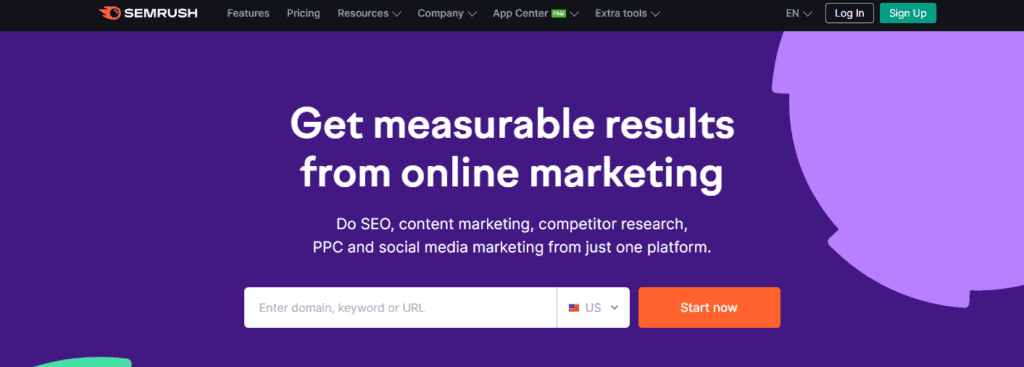
We consider Semrush to be one of the best SEO competitive analysis tools available. It offers a wide range of features that allow us to analyze our competitors’ SEO strategies and improve our own SEO performance.
Pros
- Organic Research: Semrush’s Organic Research feature allows us to enter our competitor’s domain name and see insights into their SEO strategy. We can view their top organic keywords, organic search traffic, and more. This information helps us understand their SEO strengths and weaknesses, and we can use it to improve our own strategy.
- Keyword Gap Analysis: With Semrush’s Keyword Gap tool, we can compare our website’s keywords to those of our competitors. This helps us identify keywords that our competitors are ranking for that we are not. We can then target those keywords to improve our search engine rankings.
- Backlink Analysis: Semrush’s Backlink Analysis feature allows us to analyze our competitors’ backlink profiles. We can see the number of backlinks they have, the quality of those backlinks, and more. This information helps us understand how our competitors are building backlinks and where we can improve our own backlink strategy.
- Site Audit: Semrush’s Site Audit feature allows us to analyze our website’s SEO health and identify issues that may be affecting our search engine rankings. We can also use this feature to compare our website’s SEO health to that of our competitors.
Cons
- Price: Semrush can be expensive, especially for small businesses or individuals. The pricing plans start at $119.95 per month, which may be too expensive for some users.
- Learning Curve: Semrush has a learning curve, and it may take some time to become proficient with all of its features. However, Semrush offers a wealth of resources to help users learn how to use the tool effectively.
Overall, Semrush is a powerful SEO competitive analysis tool that can help us improve our SEO performance. It offers a wide range of features that allow us to analyze our competitors’ SEO strategies, identify areas for improvement, and develop a more effective SEO strategy.
2. SE Ranking
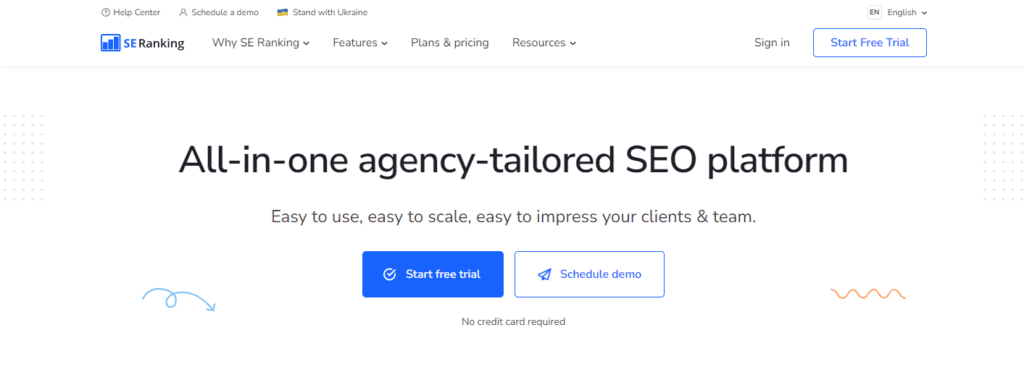
SE Ranking‘s Competitor Research tool is a comprehensive SEO and PPC analysis tool that provides valuable insights into your competitors’ strategies. It is an all-in-one SEO platform that allows you to track your rankings, conduct keyword research, and analyze your competitors’ backlinks, traffic, and more.
Pros
- Comprehensive competitor analysis: SE Ranking’s Competitor Research tool provides a comprehensive view of how any domain or its subdomains are performing in search. It supports 190 countries, collects data from any domain’s, and provides insights into your competitors’ organic and paid search strategies.
- Keyword research: SE Ranking’s Competitor Research tool allows you to research and analyze your competitors’ keywords, including the ones they are ranking for and the ones they are targeting in their paid search campaigns.
- Backlink analysis: SE Ranking’s Competitor Research tool provides insights into your competitors’ backlink profiles, including the number of backlinks, referring domains, anchor text, and more.
- Traffic analysis: SE Ranking’s Competitor Research tool allows you to analyze your competitors’ traffic sources, including organic and paid search, social media, and referral traffic.
Cons
- Limited number of competitors: SE Ranking’s Competitor Research tool only allows you to analyze up to five competitors at a time. If you need to analyze more competitors, you will need to upgrade to a higher plan.
- Limited data history: SE Ranking’s Competitor Research tool only provides data for the past six months. If you need to analyze data from a longer period, you will need to use another tool.
Overall, SE Ranking’s Competitor Research tool is a powerful SEO and PPC analysis tool that provides valuable insights into your competitors’ strategies.
3. Serpstat
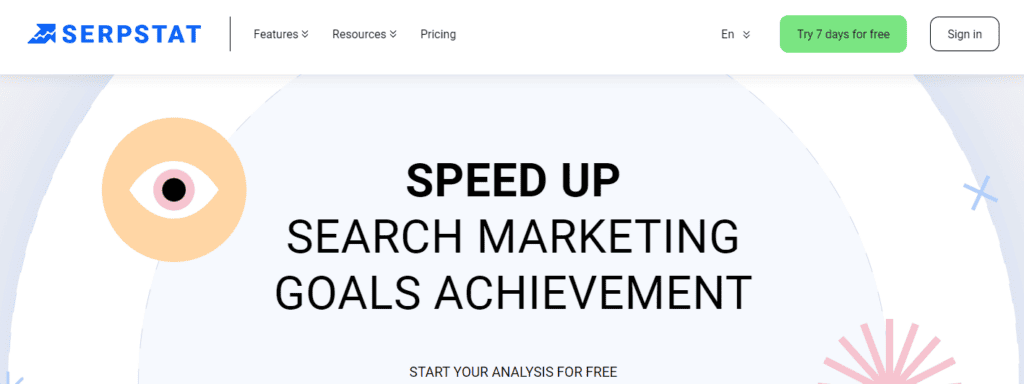
Serpstat is a comprehensive SEO tool that offers a wide range of features for competitive analysis. With Serpstat, you can also track your competitors’ positions for selected keywords using its rank tracking tool.
Pros
- Easy to use: Serpstat’s user interface is intuitive and user-friendly, making it easy for beginners to navigate.
- Comprehensive competitor analysis: Serpstat provides a wealth of data on your competitors’ SEO rankings, allowing you to identify areas where you can improve your own SEO strategy.
- Great for keyword research: Serpstat’s keyword research tool is powerful and provides users with a wide range of data on keywords, including search volume, competition, and related keywords.
- Multi-user mode: Serpstat offers a multi-user mode, allowing you to collaborate with your SEO and content teams.
- Automated rank tracking: With Serpstat, you can automate your rank tracking and receive daily reports about your SERP positions.
Cons
- Limited backlink analysis: Serpstat’s backlink analysis tool is not as comprehensive as some of its competitors, such as Ahrefs.
- Limited data for some countries: Serpstat’s data is not as comprehensive for some countries as it is for others. However, it still provides valuable insights for most regions.
Overall, Serpstat is a powerful SEO tool that provides users with a wide range of features for competitive analysis. While it may not be as comprehensive as some of its competitors in certain areas, it still offers valuable insights and is easy to use.
4. Morningscore
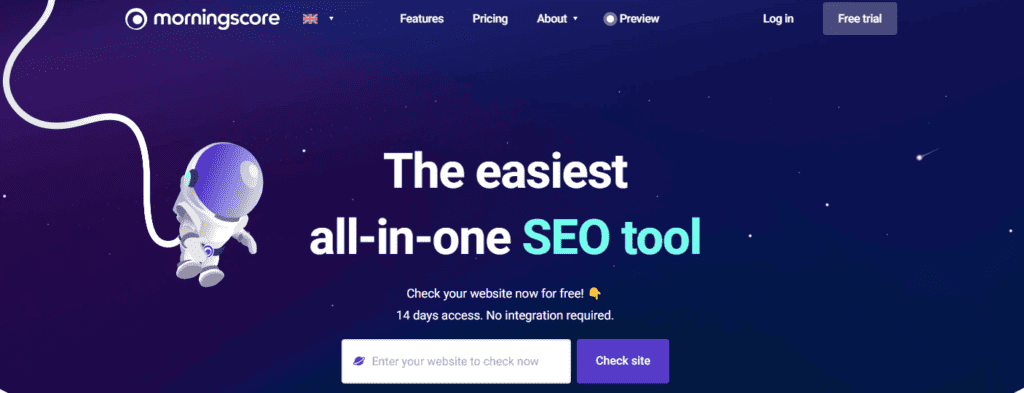
Morningscore is an all-in-one SEO tool that offers a wide range of features for competitive analysis. Here are some of the pros and cons of using Morningscore for SEO competitive analysis.
Pros
- Competitor Link Analysis: Morningscore provides a comprehensive view of your competitor’s backlink profile. You can see the full backlink profile of your competitors, find hidden backlink opportunities, and discover new links by researching other websites.
- Keyword Research: Morningscore’s keyword research tool allows you to find new keywords easily. You can monitor your keyword ranks daily and compare them with your competitors’ ranks on the same keywords.
- Anchor Text Analysis: Morningscore’s competitor backlink analysis tool offers a breakdown of the anchor texts used by your competitors, allowing you to refine your link-building and keyword strategies.
- All-in-one Solution: Morningscore offers an all-in-one solution for SEO competitive analysis. You don’t need to use multiple tools to get a comprehensive view of your competitors’ SEO strategies.
Cons
- Pricing: Morningscore’s pricing plans are relatively expensive compared to other SEO tools. However, the tool’s comprehensive features may justify the cost for businesses that require a complete SEO solution.
- Learning Curve: Morningscore’s comprehensive features can be overwhelming for beginners. It may take some time to learn how to use all the features effectively.
Overall, Morningscore is a powerful SEO tool that offers a comprehensive solution for competitive analysis. While it may have a steep learning curve and high pricing plans, its features may justify the cost for businesses that require a complete SEO solution.
5. Brand24
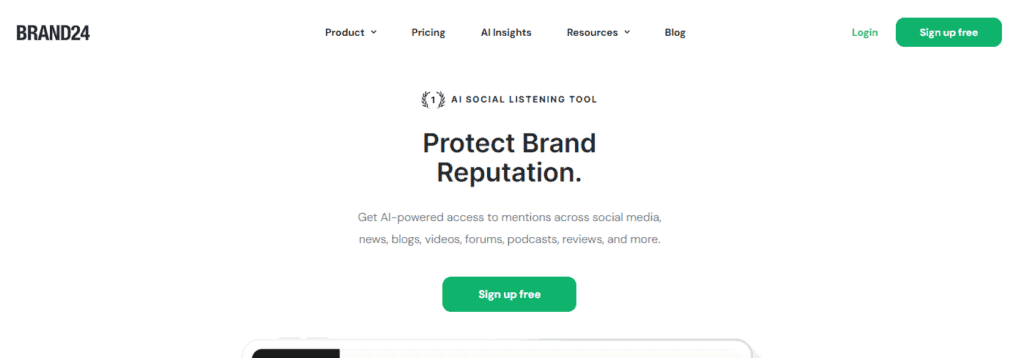
Brand24 is a great tool for monitoring brand mentions across social media. It is also useful for tracking your competitors’ online presence. Here are the pros and cons of using Brand24 for SEO competitive analysis:
Pros
- Comprehensive social media monitoring: Brand24 enables us to monitor brand mentions across various social media platforms, including Facebook, Twitter, Instagram, and more. This feature is useful for tracking our competitors’ social media presence and identifying areas where we can improve our own social media strategy.
- Real-time alerts: With Brand24, we can set up real-time alerts for specific keywords and phrases related to our competitors. This feature enables us to stay up-to-date with the latest news and trends in our industry, which can help us make more informed decisions about our SEO strategy.
- User-friendly interface: Brand24 has a user-friendly interface that is easy to navigate. We can quickly access the information we need and customize our dashboard to suit our specific needs.
Cons
- Limited keyword tracking: While Brand24 is great for monitoring brand mentions, it has limited capabilities when it comes to keyword tracking. This means that we may not be able to track all of the keywords and phrases that are important to our SEO strategy.
- Limited data export options: Brand24 has limited options for exporting data, which can be frustrating for users who want to analyze their data in more detail. However, we can still export data to CSV or Excel formats, which is better than nothing.
Overall, Brand24 is a great tool for monitoring brand mentions across social media and tracking our competitors’ online presence. While it has some limitations, it is still a valuable addition to our SEO competitive analysis toolkit.
6. Mangools

Mangools is an online platform that provides a suite of SEO tools that can help you with keyword research, SERP analysis, rank tracking, backlink analysis, and competitor research.
Pros
- Affordable pricing: Mangools offers a range of pricing plans that are affordable, making it a great option for small businesses and solo entrepreneurs.
- Easy to use: The user interface of Mangools is intuitive and easy to navigate, even for beginners. You don’t need any technical expertise to use the tools.
- Comprehensive keyword research: The KWFinder tool of Mangools provides comprehensive keyword research that includes search volume, keyword difficulty, and related keywords. This can help you find profitable keywords that your competitors may not be targeting.
- SERP analysis: The SERPChecker tool of Mangools allows you to analyze the search engine results pages (SERPs) for any keyword and location. You can see the top-ranking pages, their backlinks, and other metrics that can help you understand the competition.
- Backlink analysis: The LinkMiner tool of Mangools allows you to analyze the backlinks of any website, including your competitors’. You can see the number of backlinks, their quality, and other metrics that can help you build a better backlink profile.
- Competitor research: The SiteProfiler tool of Mangools allows you to analyze the overall SEO performance of any website, including your competitors’. You can see their organic search traffic, top-ranking keywords, backlinks, and other metrics that can help you identify their strengths and weaknesses.
Cons
- Limited features: Mangools doesn’t offer as many features as some of its competitors, such as SEMrush and Ahrefs. For example, it doesn’t have a content analysis tool or a site audit tool.
- Limited integrations: Mangools doesn’t integrate with as many third-party tools as some of its competitors, such as Google Analytics and Google Search Console.
Overall, Mangools is a great option for small businesses and solo entrepreneurs who are looking for an affordable and easy-to-use SEO toolset. While it may not offer as many features or as much data as some of its competitors, it provides comprehensive keyword research, SERP analysis, backlink analysis, and competitor research that can help you improve your SEO performance.
7. SpyFu
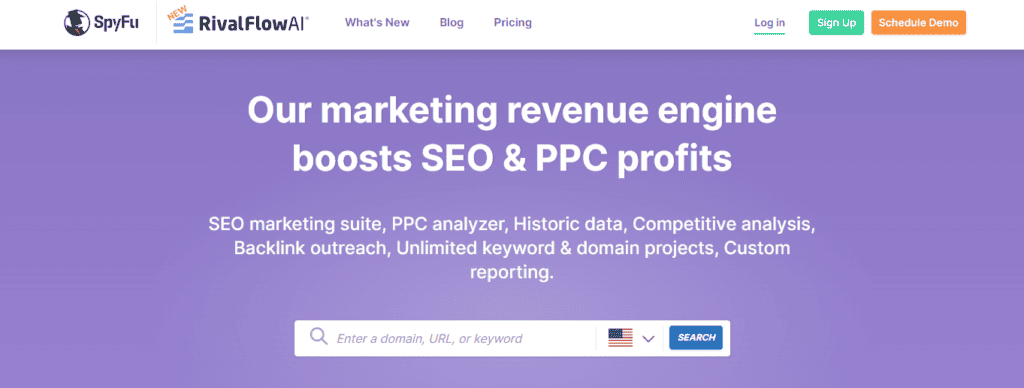
SpyFu is a powerful SEO competitor analysis tool that provides deep intelligence and insights into competitor activities. With SpyFu, we can collect valuable data on our competitors’ search engine rankings, keywords, and ad campaigns.
Pros
- Comprehensive competitor analysis: SpyFu provides a comprehensive view of our competitors’ organic and paid search strategies, including their top-performing keywords, ad copy, and landing pages.
- Keyword research: SpyFu’s keyword research tool is one of the best in the market, providing accurate and relevant data on search volume, CPC, and competition.
- Backlink analysis: SpyFu’s backlink analysis tool provides insights into our competitors’ link building strategies, including their top referring domains and anchor text distribution.
- Domain analysis: SpyFu’s domain overview feature provides a detailed analysis of our competitors’ website traffic, including their top-performing pages, traffic sources, and audience demographics.
Cons
- Pricing: SpyFu’s pricing plans are relatively expensive compared to other SEO competitor analysis tools.
- Limited features: SpyFu’s keyword research tool lacks some advanced features, such as keyword difficulty and trend analysis.
Overall, SpyFu is an excellent tool for SEO competitor analysis, providing a wealth of data and insights that we can use to improve our search engine rankings and ad campaigns. However, it may not be the best fit for beginners or those on a tight budget.
Conclusion
In conclusion, conducting an SEO competitor analysis is crucial to staying ahead in the ever-evolving world of search engine optimization. By analyzing your competitors’ websites, you can uncover valuable insights into their SEO strategies and use that information to improve your own website’s rankings.
It’s important to remember that an SEO competitor analysis is just one part of an overall SEO strategy. It’s important to constantly monitor and adjust your strategy based on changes in the industry and your competitors’ activities.
By staying up-to-date with the latest SEO trends and using the best tools available, we can ensure that our website is always performing at its best and staying ahead of the competition.
Frequently Asked Questions
How can I check my SEO competition?
To check your SEO competition, you can use tools like Semrush, SE Ranking and Serpstat. These tools allow you to analyze your competitors’ backlinks, keyword rankings, and content strategy. By understanding your competitors’ strengths and weaknesses, you can develop a more effective SEO strategy and outrank them in search engine results pages (SERPs).
What metrics should I look for when doing competitor analysis?
When doing competitor analysis, it’s important to look at metrics like backlinks, keyword rankings, traffic, and social media engagement. These metrics provide valuable insights into your competitors’ online presence and can help you identify areas where you can improve your own SEO strategy. Additionally, analyzing your competitors’ content strategy can help you identify gaps in your own content and develop a more effective content marketing plan.
